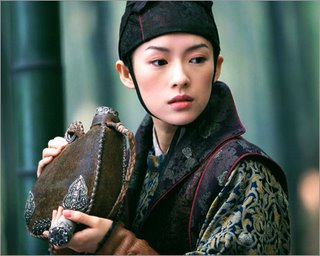RelevanT LinkS...
This link is taken via 'Rotten Tomatoes' and is a short review criticising the works of Zhang Yimou, well more precisely, his attempt to captivate a love story in House Of Flying Daggers...this will be useful to me as i can state whether Yimou's effort to make a 'love story' was just a desperate way to grab the attention of female audiences...
http://www.empireonline.com/reviews/review.asp?DVDID=10546
Additionally a positive review from Empire, stating that 'this is how action movies should be made...'
http://www.totalfilm.com/cinema_reviews/lara_croft_tomb_raider
A reveiw for Tomb Raider, one of the other texts which i might refer to as it was suggested by some other people..
http://www.screenonline.org.uk/film/id/824016/index.html
A short article which decribes 'The changing images of women in fiction film', as written by Sarah Cardwell...this will be usseful to me as i can compare the roles that women played in past to now...
http://www.kungfucinema.com/reviews/enterthedragon.htm
Enter the Dragon - website dedicated to asian cinematography, moreso centered around Kung Fu...






